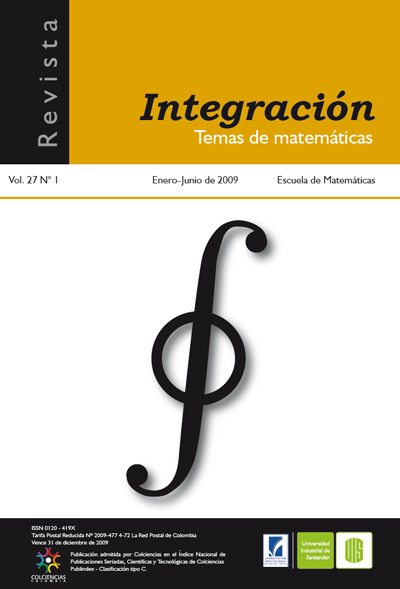Artículos científicos
Publicado 2009-11-05
Palabras clave
- Continuo,
- curva sinusoidal del topologo,
- función débilmente confluente,
- rayo
Cómo citar
Macías, S. (2009). Imágenes débilmente confluentes de la curva sinusoidal del topólogo. Revista Integración, Temas De matemáticas, 27(2), 99–123. Recuperado a partir de https://revistas.uis.edu.co/index.php/revistaintegracion/article/view/745
Resumen
En el presente trabajo se caracterizan las imágenes débilmente confluentes de la curva del topologo. Se demuestra que si G es la curva sinusoidal del topologo y f : G → Y es una función débilmente confluente, donde Y es un continuo, entonces Y es o un arco, o una curva cerrada simple, o una compactación de [0,∞) cuyo residuo es un arco o una curva cerrada simple. Más aun, si Y es alguno de estos continuos y f : G → Y es una función continua y sobreyectiva, se dan condiciones para que f sea débilmente confluente.
Descargas
Referencias
[1] R H Bing. “Snake-like Continua”, Duke Math. J., 18 (1951), 653-663.
[2] J. A. Brooks. Weakly Confluent Images of the Sinusoidal Curve, Tesis de Maestría, West Virginia University, 1988.
[3] J. J. Charatonik. “Confluent Mappings and Unicoherent Continua”, Fund. Math., 56 (1964), 213-220.
[4] C. A. Eberhart, J. B. Fugate y G. R. Gordh, Jr. “Branchpoint Covering Theorems for Confluent and Weakly Confluent Maps”, Proc. Amer. Math. Soc., 55 (1976), 409-415.
[5] S. Eilenberg y N. Steenod. Foundations of Algebraic Topology, Princeton Univ. Press, Princeton, N. J., 1952.
[6] E. E. Grace y E. J. Vought. “Semi-confluent and Weakly Confluent Images of Treelike and Atriodic Continua”, Fund. Math., 101 (1978), 151-158.
[7] J. G. Hocking y G. S. Young. Topology, Dover, New York, 1988.
[8] A. Lelek, Some Problems Concerning Curves, Colloq. Math., 23 (1971), 93-98.
[9] S. Macías. La Estructura de los Dendroides Suaves, Aportaciones Matemáticas #10 de la Sociedad Matemática Mexicana, 1993.
[10] S. Macías. Topics on Continua, Pure and Applied Mathematics Series, Vol. 275, Chapman & Hall/CRC, Taylor & Francis Group, Boca Raton, London, New York, Singapore, 2005.
[11] J. van Mill. Infinite-dimensional Topology, North Holland, Amsterdam, 1989.
[12] S. Mardešić y J. Segal. “ε-mappings onto Polyhedra”, Trans. Amer. Math. Soc.,109 (1963), 146-164.
[13] S. B. Nadler, Jr. “Multicoherence Techniques Applied to Inverse Limits”, Trans. Amer. Math. Soc., 157 (1971), 227-234.
[14] S. B. Nadler, Jr. “Arc Components of Certain Chainable Continua”, Canadian Math. Bull., 14 (1971), 183-189.
[15] S. B. Nadler, Jr. “Confluent Images of the Sinusoidal Curve”, Houston J. Math., 3 (1977), 515-519.
[16] S. B. Nadler, Jr. Continuum Theory: An Introduction, Monographs and Textbooks in Pure and Applied Math., Vol. 158, Marcel Dekker, New York, Basel, Hong Kong, 1992.
[17] S. B. Nadler, Jr. y J. Quinn. “Embeddability and Structure Properties of Real Curves”, Memoirs Amer. Math. Soc., Vol. 125, Providence R. I., 1972.
[18] S. B. Nadler, Jr. y J. Quinn. “Embedding Certain Compactifications of a Half-ray”, Fund. Math., 78 (1973), 217-225.
[19] D. R. Reed. “Confluent and Related Mappings”, Colloq. Math., 29 (1974), 233-239.
[20] G. T. Whyburn. Analytic Topology, Amer. Math. Soc. Colloq. Publ., Vol. 28, Providence, R. I., 1942.
[2] J. A. Brooks. Weakly Confluent Images of the Sinusoidal Curve, Tesis de Maestría, West Virginia University, 1988.
[3] J. J. Charatonik. “Confluent Mappings and Unicoherent Continua”, Fund. Math., 56 (1964), 213-220.
[4] C. A. Eberhart, J. B. Fugate y G. R. Gordh, Jr. “Branchpoint Covering Theorems for Confluent and Weakly Confluent Maps”, Proc. Amer. Math. Soc., 55 (1976), 409-415.
[5] S. Eilenberg y N. Steenod. Foundations of Algebraic Topology, Princeton Univ. Press, Princeton, N. J., 1952.
[6] E. E. Grace y E. J. Vought. “Semi-confluent and Weakly Confluent Images of Treelike and Atriodic Continua”, Fund. Math., 101 (1978), 151-158.
[7] J. G. Hocking y G. S. Young. Topology, Dover, New York, 1988.
[8] A. Lelek, Some Problems Concerning Curves, Colloq. Math., 23 (1971), 93-98.
[9] S. Macías. La Estructura de los Dendroides Suaves, Aportaciones Matemáticas #10 de la Sociedad Matemática Mexicana, 1993.
[10] S. Macías. Topics on Continua, Pure and Applied Mathematics Series, Vol. 275, Chapman & Hall/CRC, Taylor & Francis Group, Boca Raton, London, New York, Singapore, 2005.
[11] J. van Mill. Infinite-dimensional Topology, North Holland, Amsterdam, 1989.
[12] S. Mardešić y J. Segal. “ε-mappings onto Polyhedra”, Trans. Amer. Math. Soc.,109 (1963), 146-164.
[13] S. B. Nadler, Jr. “Multicoherence Techniques Applied to Inverse Limits”, Trans. Amer. Math. Soc., 157 (1971), 227-234.
[14] S. B. Nadler, Jr. “Arc Components of Certain Chainable Continua”, Canadian Math. Bull., 14 (1971), 183-189.
[15] S. B. Nadler, Jr. “Confluent Images of the Sinusoidal Curve”, Houston J. Math., 3 (1977), 515-519.
[16] S. B. Nadler, Jr. Continuum Theory: An Introduction, Monographs and Textbooks in Pure and Applied Math., Vol. 158, Marcel Dekker, New York, Basel, Hong Kong, 1992.
[17] S. B. Nadler, Jr. y J. Quinn. “Embeddability and Structure Properties of Real Curves”, Memoirs Amer. Math. Soc., Vol. 125, Providence R. I., 1972.
[18] S. B. Nadler, Jr. y J. Quinn. “Embedding Certain Compactifications of a Half-ray”, Fund. Math., 78 (1973), 217-225.
[19] D. R. Reed. “Confluent and Related Mappings”, Colloq. Math., 29 (1974), 233-239.
[20] G. T. Whyburn. Analytic Topology, Amer. Math. Soc. Colloq. Publ., Vol. 28, Providence, R. I., 1942.
